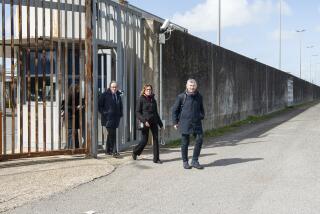Europeans balk at taking Guantanamo detainees
LONDON â If you wonât take them, why should we?
That question has ricocheted across Europe as the Obama administration tries to fulfill its promise to shut down the detention center at Guantanamo Bay, Cuba. Though Europeans laud that goal, many countries in the region remain skeptical about taking in former inmates, especially as the United States appears increasingly unwilling to allow any within its borders.
That unwillingness is apparent as the U.S. and the European Union engage in delicate talks over the issue, negotiations that some observers say could produce procedural guidelines on resettling detainees and a joint announcement as early as Monday.
Last week, Martin Pecina, the interior minister of the Czech Republic, which holds the EU presidency, said that the 27-nation bloc might admit âseveral dozenâ former prisoners, with decisions left up to each country. Because of freedom of movement across the EU, governments would share intelligence and coordinate security to ensure that none of the detainees pose a threat.
But comments by German Interior Minister Wolfgang Schaeuble illustrate just what a hard sell it is for Washington.
âIf none of the U.S. states are ready to take in Guantanamo inmates, then you will have to explain to the European public why the rules for Europe should be different from those in the U.S.,â Schaeuble said last week.
Germany, the most populous country in the union, has proved to be one of the most resistant to accepting prisoners from Guantanamo, although it has been one of the most vocal in saying that the facility ought to be shuttered. More than 200 people are still being held at the detention center, which became a symbol for many Europeans of what they perceived as the Bush administrationâs disregard for human rights and international norms of justice and due process.
German news media reported Friday that the government of Chancellor Angela Merkel had turned down, at least for now, a U.S. request to accept two detainees, identified as a Syrian and a Tunisian.
Information provided by the U.S. about the two men was too scanty for Germany to accede to the request, the Sueddeutsche Zeitung newspaper reported. It said Germany had three tests for admission: the person is not deemed a security threat, he canât be repatriated to his home country or sent to the U.S., and there is a good reason for him to be relocated to Germany.
Berlin had already declined to allow in a group of Uighur detainees, despite a large Uighur population in southern Germany.
The Uighurs are a Muslim, Turkic-speaking people of western China; any of the prisoners sent back there are liable to face prosecution by the Beijing government for alleged separatist activity. Some of the Uighurs from Guantanamo are being resettled on islands: in Bermuda in the Atlantic and in the Pacific archipelago nation of Palau.
In Washington, the Justice Department said Friday that three more Guantanamo detainees had been transferred.
The detainees were sent back to Saudi Arabia, their home country, where officials will review their cases before sending them to a rehabilitation program. One of them was identified as Ahmed Zuhair, a relatively high profile detainee who, has been protesting his detention since 2005 through a hunger strike and has been force-fed liquid nutrients.
During a hearing in Guantanamo in October 2004, Zuhair was accused of involvement in the 1995 killing in Bosnia-Herzegovina of William Jefferson, a U.S. official with the United Nations. At the tribunal, U.S. officials said Jeffersonâs watch was found on Zuhair.
Zuhair also was convicted in absentia by a Bosnian court in a 1997 car bombing in the town of Mostar. He also allegedly told another detainee he was involved in the bombing of the U.S. destroyer Cole in 2000, according to evidence presented at a Guantanamo proceeding.
European countries such as Britain, France and Spain have already taken in former Guantanamo detainees, who were often citizens or residents of those nations. Italy, Portugal and Belgium have also said that they would consider taking former inmates.
âThanks to its experience with mafia bosses detained in maximum-security prisons, Italy can guarantee appropriate structures,â said Paola Severino, a professor of criminal law at LUISS Guido Carli University in Rome.
After last weekâs meeting of EU interior ministers, Pecina of the Czech Republic emphasized that âthe primary responsibility for finding solutions to this problem and for the placement of the persons released lies above all with the United States.â
Also under discussion is whether Washington will contribute toward the cost of resettling the former inmates.
And London complained that it was not consulted in the decision to send four Uighurs to Bermuda, which comes under British control in the realm of defense and foreign policy.
--
Janet Stobart of The Timesâ London Bureau and Times staff writers Maria de Cristofaro in Rome and Julian E. Barnes in Washington contributed to this report.
More to Read
Sign up for Essential California
The most important California stories and recommendations in your inbox every morning.
You may occasionally receive promotional content from the Los Angeles Times.











